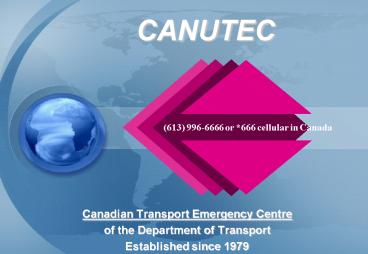CANUTEC - PowerPoint PPT Presentation
1 / 22
Title:
CANUTEC
Description:
... Polish, Turkish, Japanese, Chinese and Dutch versions ... Addition of all new UN 12th and UN 13th editions. Review of ERIC cards contents for evaluation of ... – PowerPoint PPT presentation
Number of Views:717
Avg rating:3.0/5.0
Title: CANUTEC
1
CANUTEC
- Canadian Transport Emergency Centre
- of the Department of Transport
- Established since 1979
2
Mississauga Train Derailment, Nov. 10, 1979
- Evacuation of 250,000 people
- Full tank car losses of Chlorine and LPG
- CANUTEC had begun operations on July 3rd 1979
just 4 months prior to the Mississauga Derailment
3
CANUTEC description
- Operated by the Government of Canada.
- Provides free access to information and available
for use by anyone with respect to any product. - Offers a free registration program to all
Canadian companies for CANUTECs 24-hour
emergency telephone number. - Registration provides ability to meet regulatory
requirement for 24-hour emergency number. - Direct and immediate access to knowledgeable
chemists, biochemists and chemical engineers
experienced in dealing with chemical accidents - Efficient gathering of technical information on
chemical products and emergency response
procedures. - Direct access to Emergency Response Assistance
Plans (ERAPs) industry teams.
4
CANUTEC Advisors
- Scientists with chemistry, biochemistry, chemical
engineering backgrounds - Excellent communication skills
- Capacity to handle stressful situations
- Operates 24 hours/7days per week
- Eagerness to help personality
- Teamwork is a critical quality
- Training/continuous learning is essential
- Bilingual (English and French)
5
CANUTEC TDG Regulations
- Under Parts 3.5 (1) (f) and 3.5 (2), shipping
documents must show the following information - (f) the words 24-Hour Number, or an
abbreviation of these words, followed by a
telephone number, including the area code, at
which the shipper can be reached immediately for
technical information about the dangerous goods
in transport, without breaking the telephone
connection made by the caller - CANUTEC may be used, however, the shipper must
receive permission, in writing, from CANUTEC
6
OUR CLIENTS
Carriers
Post Offices and Courier Services
Anyone needing help
7
ESSENTIAL CONTACTS DATABASE
- Chemical Producers
- Bomb Disposal Squads
- Chemical Emergency Responders
- Emergency Services
- Nuclear Emergency Responders
- Hospitals and Poison Control Centers
- Airports/Ports
- Federal/Provincial/State/Municipal Government
- International Emergency Responders
8
Industry Mutual Aid Response Groups
- COMPGEAP The Compressed Gas Emergency Action
Plan - CCPA-TEAP The Transportation Emergency
Assistance Plan - CHLOREP The Chlorine Emergency Plan.
- SMART The Sulfur Dioxide Mutual Assistance
Response Team - LPGERC Liquefied Propane Gas Emergency Response
Corporation - CERCA Network of private emergency response
contractors
9
PROFILE OF NATIONAL REGISTRY OF ERAPs
- - 1400 Emergency Response Assistance Plans
- - 4600 PUBLIC AND PRIVATE ORGANIZATIONS
- - COMPRESSED GASES (CHLORINE, ANHYDROUS AMMONIA
AND PROPANE), EXPLOSIVES, AND INFECTIOUS
SUBSTANCES ARE THREE MAIN CLASSES OF DANGEROUS
GOODS COVERED - - ALMOST EXCLUSIVELY FILED BY SHIPPERS
- - 13 ROAD CARRIERS AND 4 RAIL CARRIERS HAVE
APPROVED ERAP - - REGISTRY DIRECTLY ACCESSIBLE TO CANUTEC
10
Material Safety Data Sheets (MSDS)
- CANUTEC manages close to 1.5 million MSDS in
paper and electronic format - Several thousands are received every month
- Relied upon by North American emergency
responders for health and safety information - MSDS Information is specifically critical for
non-transport related incidents - Information described and transmitted to
emergency response scene
11
Useful tools for Emergency Response
- BENZENE vapor pressure is 79.38 mm of mercury at
70 degrees Farenheit. - The concentration in air will be as follows
- (79.38 mm Hg/760 mmHg) X 100 10.4
- LEL is 1.3 and UEL is 7.9
- The level at the source is above the UEL but in
the surrounding area, due to dispersion, you will
be between LEL and UEL. - Vapor density is 2.7 and will cling to the
ground. - At 10.4 this is equal to 104,000 ppm directly at
the source. You are way above the IDLH which is
500 ppm.
12
SERVICES/INFORMATION PROVIDED BY CANUTEC
Technical information, properties, behaviour
and incompatibilities
13
Example of CANUTECs Information system
14
Total number of calls per year
15
Total number of emergencies per year
16
Shift statistics for 2005
18397
20000
18000
16000
11827
14000
12000
Calls
10000
Emergencies
8000
6000
3367
4000
356
361
162
2000
0
Day
Evening
Night
17
1996 North American Emergency Response Guidebook
- The NAERG96 was the result of an International
collaborative effort among Canada, the United
States and Mexico. - Initiated under NAFTA, intended to improve
hazards communication among the three countries
by harmonizing emergency response recommendations
to transportation incidents.
18
ERG2000 Additions
- 150 new materials entries
- Revisions to several Guidepages
- Chemical warfare agents
- Water reactive materials
- CBW agents information text
- Tank car Silhouettes
- Tank truck Silhouettes
- English, French, Spanish, Korean, Italian,
German, Russian, Hungarian, Polish, Turkish,
Japanese, Chinese and Dutch versions - Ergo databases
- Internet interactive version
19
Emergency Response Guide 2004
- Deletion of old organic peroxide names
- Deletion of pre 1995 US NA numbers
- Deletion of all Canadian NA numbers
- Addition of all new UN 12th and UN 13th editions
- Review of ERIC cards contents for evaluation of
ERG2000 Guidepages
20
Emergency Response Guide 2004
- Approximately 700 shipping names deleted
- Approximately 250 shipping names added
- Approximately 100 shipping names moved to a
different Guidepage related mostly to
firefighting foam application - Approximately 15 shipping names added to the
TIHWR listing - Addition of radiological-related information in
the Criminal-terrorist recognition section
21
BLEVE Research
22
ELECTRONIC HIGHWAY
- E-MAIL ADDRESS CANUTEC_at_TC.GC.CA
- WEB SITE http//WWW.CANUTEC.GC.CAThe Web page
contains CANUTEC brochure, registration
information, statistics, ERG2004, articles
written by advisors, chemical spill related links
on the Internet, readers comment section, etc.































